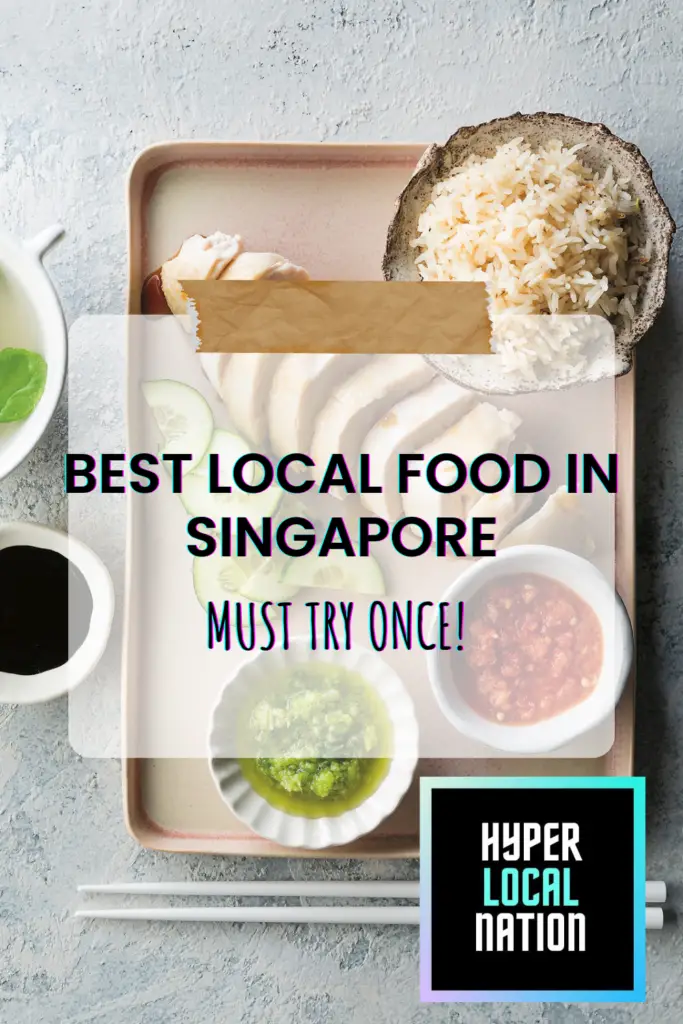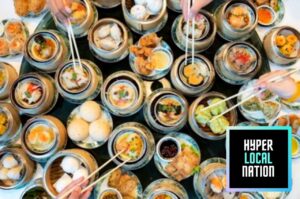Food is considered crucial to Singapore’s nationhood and as a unifying cultural thread. People from various communities frequently eat together while respecting each other’s cultures and choosing food that is suitable for all. If you are in Singapore and you want to try their local food but have no idea where to start, we are here to help you! We bring you a list of some of the must-try best local food in Singapore that you do not want to miss. We have categorised the list into the most affordable, most unique, and most delicious local food in Singapore.
Food cravings alert!
Before we get to the list, if you looking for the best places to eat at Orchard, Club Street or Ann Siang Hill, you can check out this link:
-
Orchard Road Food Guide – Exclusive Gems, Affordable & Unique Dining Experience
-
16 Best Restaurants on Club Street & Ann Siang Hill – Food Guide
*MOST AFFORDABLE FOOD IN SINGAPORE*
1. Maggi Goreng
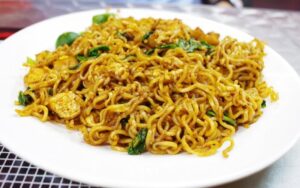
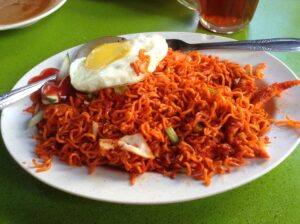
This Malaysian-based dish and made famous by Mamak (Indian-Muslim) restaurants. There is no one way to prepare a plate of Maggi Goreng so one will be able to see many styles of Mamak Goreng. You can find Maggi Goreng at Indian restaurants or hawker stalls in Singapore. If you’re hungry and looking for a quick meal, you can’t go wrong with Maggi Goreng!
| Place of Origin | Malaysia |
| Alternative name | NA |
| Type/ Course | Noodles/ Snacks |
| Main Ingredients | Instant noodle |
| Best Time to Eat | Breakfast, Supper |
2. Nasi Lemak
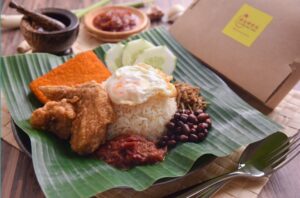
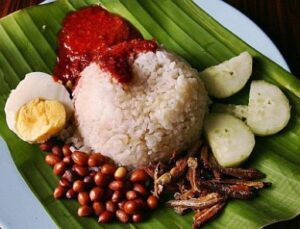
The most popular breakfast item is Nasi Lemak. The combination taste of the spicy sauce (sambal) with fragrant rice cooked with coconut milk, and pandan leaf, which comes with the salty taste of anchovies and roasted peanuts is a gastronomic delight. This Singaporean native dish is commonly sold at hawker food centres and roadside stalls in Singapore. Nasi Lemak Kukus, which translates as “steamed nasi lemak,” is another name for nasi lemak that is served with steamed rice.
| Place of Origin | Malaysia |
| Alternative name | NA |
| Type/ Course | Rice/ Main course |
| Main Ingredients |
|
| Best Time to Eat | Breakfast |
3. Hainanese Chicken Rice
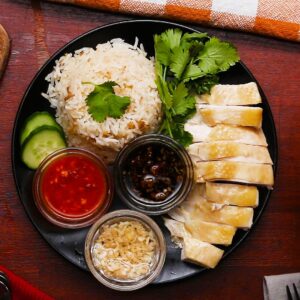
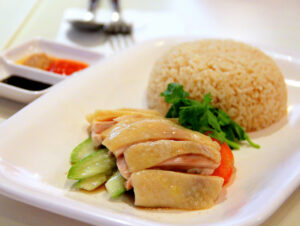
Hainanese chicken rice has become an icon of Singaporean cuisine. This local food consists of fleshy steamed white chicken cut into bite-sized pieces and served on fragrant rice with light soy sauce. The dish is garnished with coriander leaf sprigs and sesame oil, and it comes with a garlic-chilli dip. Two words to describe this dish are tasty and aromatic.
| Place of Origin | Southeast Asia |
| Alternative name |
|
| Type/ Course | Rice/ Main course |
| Main Ingredients |
|
| Best Time to Eat | Lunch, Dinner |
4. Satay
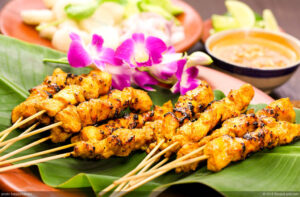
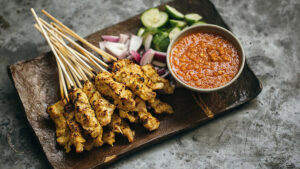
Satay, which originated from the Arabs, has been adapted to the multicultural palates of Asians, with various spicy sauces and methods of marinating the meat (usually chicken and beef). It’s made of skewered meat slices that are grilled and eaten with a peanut sauce dip. Satay is now available in many hawker centres, and entire enterprises have sprung up around it.
| Place of Origin | Indonesia |
| Alternative name |
|
| Type/Course | Entrée or main course |
| Main Ingredients |
|
| Best Time to Eat | Tea time, Dinner |
5. Tau Huay
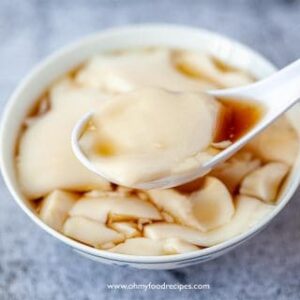
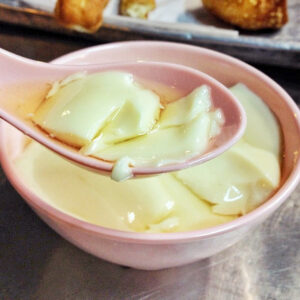
Tau Huay is a sweet tofu pudding covered in maple syrup and has a velvety smooth, wobbling texture. The silky-smooth texture of this soybean pudding is reminiscent of panna cotta. It is wonderful served warm or chilled and is sweetened with simple syrup. It would be great to enjoy a bowl of Tau Huay after your meal.
| Place of Origin | China |
| Alternative name |
|
| Type/Main Course | Snack, Dessert |
| Main Ingredients | Tofu |
| Best Time to Eat | Tea time |
6. Ice Kacang
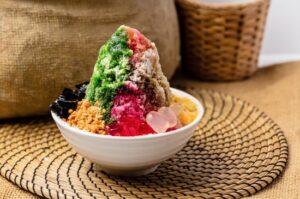

A Malay delicacy known as Ice Kacang or Ais Kacang is popular in Malaysia, Singapore, and Indonesia. Sweet corn, peanuts (sometimes referred to as “peanut kachang”), evaporated or condensed milk, mango, durian, ice cream, gula Melaka syrup, basil seeds, and cendol are all common toppings. The hawker booths, food courts, and malls all serve this bizarre treat. Some variants exclude the multi-coloured syrup and are only drizzled with gula Melaka syrup when served.
| Place of Origin | Malaysia |
| Alternative name |
|
| Type/ Main Course | Dessert |
| Main Ingredients |
|
| Best Time to Eat | Tea-time |
7. Roti Prata
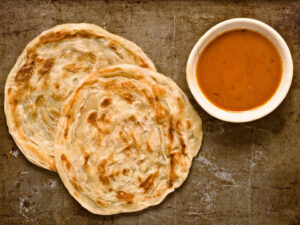
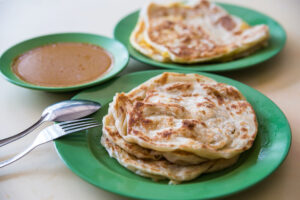
Roti Prata always hits the spot since it is soft on the inside and crispy on the outside. It is typically eaten with fish or mutton stew and is a South Indian flatbread produced by frying stretched dough flavoured with ghee (Indian clarified butter). Whatever its origin, roti prata is a filling meal for any time of day. Local eateries now offer a range of contemporary adaptations, such as cheese, chocolate, ice cream, and even durian, converting it from the main course to a dessert. The traditional varieties are still served plain or with eggs as a filling.
| Place of Origin | Southeast Asia |
| Alternative name |
|
| Type/ Course | Flatbread/ Main Course |
| Main Ingredients |
|
| Best Time to Eat | Breakfast |
8. Cendol
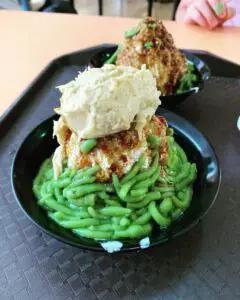
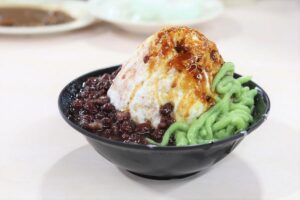
Cendol, Southeast Asia’s coolest dessert, is an iced sweet treat that includes palm sugar syrup, coconut milk, and drops of green rice flour jelly. Some cendol comes with creamed corn, jackfruit, or pulut (glutinous rice) on top, or it may have tapioca pearls mixed in with the ice. Cendol is a particularly pleasant option for afternoon tea, especially in summer.
| Place of Origin | Southeast Asia |
| Alternative Name |
|
| Type | Dessert |
| Main Ingredients |
|
| Best Time to Eat | Afternoon tea |
9. Duck Rice
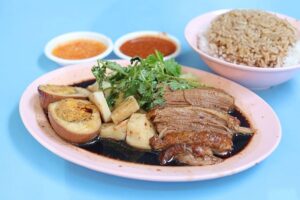
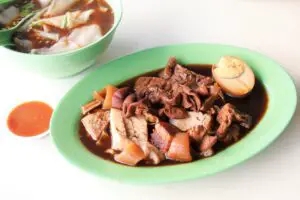
Braised duck is served with yam and shrimp rice. It can be served with white rice and a thick dark sauce on the side, or with braised hard-boiled eggs, preserved salted vegetables, and hard bean curd (tau kua). Teochew boneless duck rice is a more refined version. The duck is deboned and thinly sliced, allowing the sauces to penetrate the meat. Roasted duck rice is also widely available. This is a food comfort because it is cost-effective, and the duck rice has a lot of authenticity and flavour.
| Place of Origin | Singapore |
| Alternative name | NA |
| Type/ Course | Main Course |
| Main Ingredients |
|
| Best Time to Eat | Lunch, Dinner |
10. Char Kway Teow
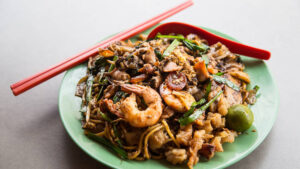
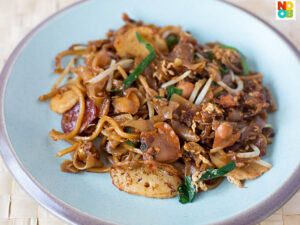
Char kway teow is popular local food in Malaysia and Singapore. Despite regional variations, it is typically made with flat rice noodles, shrimp, eggs, cockles, bean sprouts, chives, and Chinese sausage. This dish will never get old because it has such a nice balance of different elements.
| Place of Origin | Southeast Asia |
| Alternative name | NA |
| Type/ Course | Noodle/ Main course |
| Main Ingredients |
|
| Best Time to Eat | Dinner, Supper |
11. Curry Puff


Curry puffs can be found in the night market, bakeries, and food stalls in shopping malls. Furthermore, the aforementioned epok-epok is a popular variation in some of Singapore’s hawker centres, particularly among Malay stalls. Alternatively, the more common type of curry puff has a thick or flaky English-style crust with a filling that combines Chinese and Indian flavours. Curry puffs go well with a cup of tea in the evening.
| Place of Origin | Maritime Southeast Asia |
| Alternative name |
|
| Type/ Course | Snack, Appetizer |
| Main Ingredients |
|
| Best Time to Eat | Tea-time |
12. Popiah
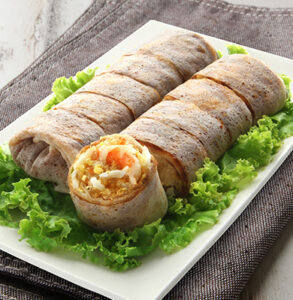
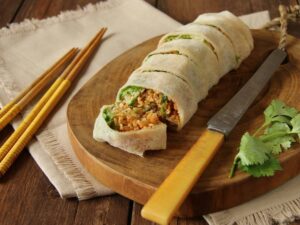
Popiah is a type of fresh spring roll that you can find in Singapore and is popular as part of Chinese cuisine as local street food. These hand-wrapped pastry rolls with a vegetable filling are served with a sweet sauce, a blended soy sauce or hoisin sauce, a shrimp paste sauce, and, if desired, a hot chilli sauce.
| Place of Origin | Fujian, China |
| Alternative name | po̍h-piá |
| Type/ Course | Fritter, Snack |
| Main Ingredients |
|
| Best Time to Eat | Tea-time |
13. Kaya toast
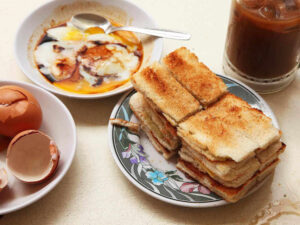

Kaya toast is a dish that consists of two slices of toast with butter and kaya, which is typically served with coffee and soft-boiled eggs. The dish is commonly eaten for breakfast in Singapore. To enjoy the traditional Hainanese breakfast, crack the soft-cooked egg into a bowl and season with soy sauce and white pepper to taste. The kaya toast should then be generously dipped into it before serving.
| Place of Origin | Singapore |
| Alternative name | Roti Bakar |
| Type/ Course | Toast/ Staple food |
| Main Ingredients |
|
| Best Time to Eat | Breakfast |
14. Roti John


Roti John is a local food made of fried sliced halves of a French loaf topped with minced meat, sliced onions, and an egg. The outside of a good roti john is crispy, while the meat and egg mixture remains soft and the onions are crunchy. It’s typically served in bite-size slices with green chillies, tomato sauce, and sweet chilli sauce on the side. You must try this popular Roti John to realize that it is most likely one of the simplest and most delicious sandwiches you have ever eaten.
| Place of Origin | Singapore |
| Alternative name | NA |
| Type/ Course | Sandwich / Main course, Snack |
| Main Ingredients |
|
| Best Time to Eat | Breakfast |
15. Pulut Hitam
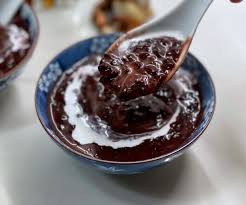
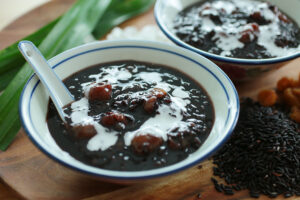
Bubur Pulut Hitam is an Indonesian sweet dessert made from porridge of black glutinous rice. It is a rich and creamy porridge with the essence of fresh pandan leaves in fresh creamy coconut milk. This black sticky rice dessert is a favourite among the locals. It is one of the most popular local food in Singapore and is a widely consumed dessert among Nyonya and Peranakan families.
| Place of Origin | Indonesia |
| Alternative name | NA |
| Type/ Course | Dessert |
| Main Ingredients |
|
| Best Time to Eat | Tea-time |
16. Tauhu Goreng
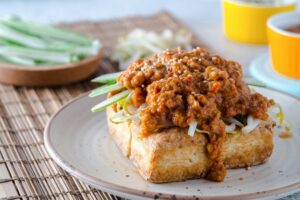
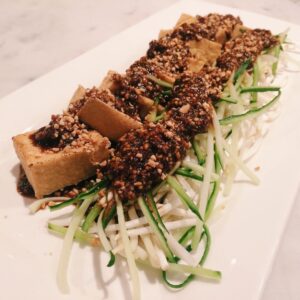
Deep-fried tofu slathered in roasted ground peanuts and a caramelized sweet and spicy sauce made from Gula Melaka, tamarind, dark soy sauce, chillies, and garlic. It is so versatile that it can be found almost anywhere. It’s not only a favourite of home cooks, but it’s also widely available in restaurants and food stalls.
| Place of Origin | China |
| Alternative name | Tahu |
| Type/ Course | Appetizer |
| Main Ingredients | Tofu |
| Best Time to Eat | Any time of the day |
17. Begedil
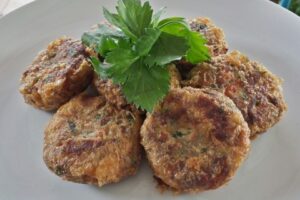
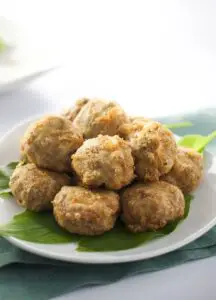
Perkedel kentang, also known as bergedil or begedil in Singapore and Malaysia, is a popular Indonesian side dish that can be eaten alone or with Soto. The original patties were made with many other ingredients besides potatoes in some regions, with some variations including minced fish, ground corn, or tofu as a dominant element. Begedil can be found at hawker stalls all over Singapore.
| Place of Origin | Indonesia |
| Alternative name |
|
| Type/ Course | Fritter |
| Main Ingredients |
|
| Best Time to Eat | Tea |
18. Acar
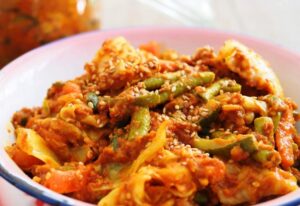
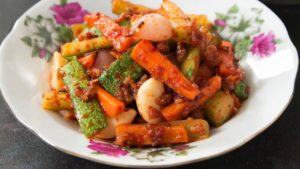
Acar is a classical mixed vegetable pickle made with cabbage, carrots, cucumber, or long beans that has been graciously flavoured with chilis and sliced shallots. Before being mixed with salty, lightly sweetened water and vinegar brine, all of the vegetables are cut into thin strips or diced into larger chunks. It is well-known for its delectable, sour, sweet, and spicy flavour.
| Place of Origin | Maritime Southeast Asia |
| Alternative name | Atjar (Dutch) |
| Type/ Course | Condiment, salad/ side dish |
| Main ingredients |
|
| Best Time to Eat | Lunch, Dinner |
*MOST UNIQUE FOOD IN SINGAPORE*
19. Dim Sum
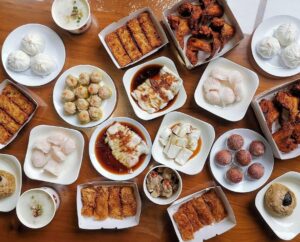
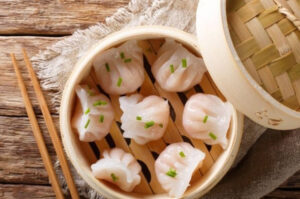
Dim sum is a traditional Chinese meal consisting of small plates of dumplings and other snack dishes served with tea. The dishes are shared among family and friends, similar to how the Spanish eat tapas. Dim sum dishes include a variety of seafood, meat, and vegetable dishes that can be steamed, fried, or baked. Dim sum is typically consumed between the hours of late morning and lunchtime.
| Place of Origin | China |
| Alternative name | NA |
| Type/ Course | Fritter |
| Main Ingredients |
|
| Best Time to Eat | Tea, Lunch |
20. Bak Kut Teh
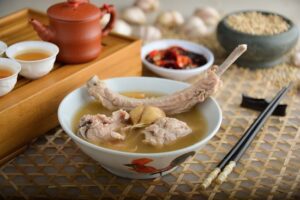
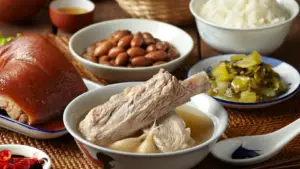
Bak Kut Teh is a broth-cooked pork rib dish popular in Malaysia and Singapore. The dish contains no tea, despite its name; the name refers to a strong oolong Chinese tea that is usually served together with the soup in the belief that it dilutes or dissolves the copious amount of fat consumed in this pork-laden dish. Teochew soups are typically clear and light in flavour. As a result, the Teochew version of bak kut teh is only seasoned with garlic, soy sauce, and pepper, and the soup is simmered and skimmed. The result is a fine, light brown consommé with a garlicky, peppery flavour.
| Place of Origin |
|
| Alternative name | NA |
| Type/ Course | Main dish |
| Main Ingredients |
|
| Best Time to Eat | Brunch |
21. Steamboat
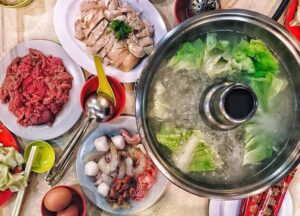
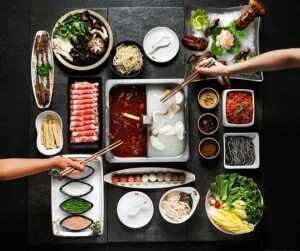
Steamboat is a Chinese cooking method in which foods are cooked once in a pot with soup. A pot of soup stock simmers on the dining table, and a variety of Chinese foods and ingredients are served alongside the pot for diners to add to the hot stock. It’s a treat to share with family and friends.
| Place of Origin | China |
| Alternative name | Hot pot |
| Type/ Course | Main dish |
| Main Ingredients |
|
| Best Time to Eat | Dinner |
22. Sliced Fish Soup
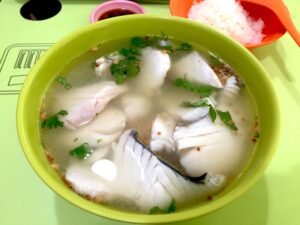
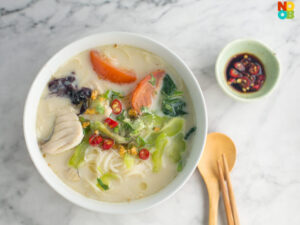
Sliced fish soup is a Singaporean dish that is thought to have originated from Teochews. It is made up of fish, vegetables, and bean curd; with cuttlefish and prawns, it is called seafood soup. It is available in most food stalls and costs between SGD 3.50 and SGD 5. This savoury bowl of hot soup demonstrates that healthy foods can be both comforting and delicious.
| Place of Origin | Singapore |
| Alternative name | NA |
| Type/ Course | Soup |
| Main Ingredients |
|
| Best Time to Eat | Dinner |
23. Appam
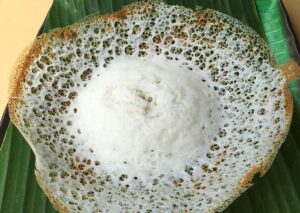
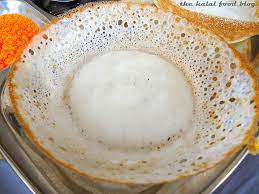
Appam is a type of South Indian pancake made with fermented rice batter and coconut milk. It is typically consumed for breakfast or dinner. When paired with vegetable stew for a hearty vegetarian breakfast, thin and crispy appam with a soft fluffy center tastes delicious. In addition, they are gluten-free and vegan.
| Place of Origin | India |
| Alternative name |
|
| Type/ Course | Pancake |
| Main Ingredients | Rice batter |
| Best Time to Eat | Breakfast |
24. Bak Chor Mee
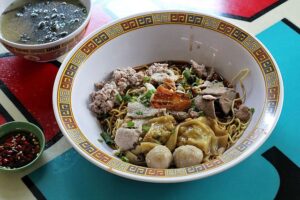
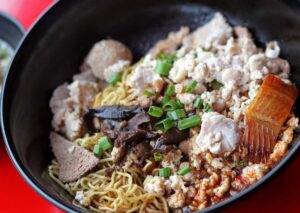
Bak Chor Mee is popular street food in Singapore. It’s a vinegar-tossed noodle dish with minced meat, pork slices, pork liver, stewed sliced mushrooms, meatballs, and deep-fried lard bits. The addition of chilli is optional, and you can choose between mee pok and mee kia. You can also choose between a dry and a soup version. Traditional hawkers will also garnish with a few small pieces of fried crispy sole fish and Chinese lettuce.
| Place of Origin | Singapore |
| Alternative name | NA |
| Type/ Course | Noodle/Main Course |
| Main Ingredients |
|
| Best Time to Eat | Breakfast |
25. Oyster Omelette
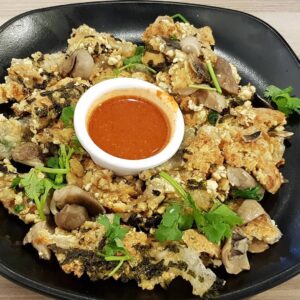
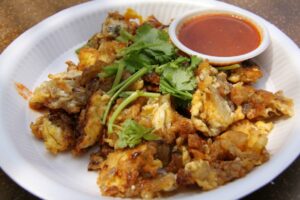
Oyster omelette is a Chinese dish made of eggs and oysters, but unlike other omelettes, it has a crunchy texture due to the diluted starch added to its ingredients. The oyster omelette is served with a Southeast Asian twist in Singapore: a saucer of chilli sauce spiked with lime for a touch of acidity to cut through the grease. It is available at Singapore hawker stalls. To provide an extra kick, spicy or chilli sauce mixed with lime juice is frequently added.
| Place of Origin | China |
| Alternative name | NA |
| Type/ Course | Side dish |
| Main Ingredient |
|
| Best Time to Eat | Breakfast, lunch, dinner |
26. Hokkien Prawn Mee
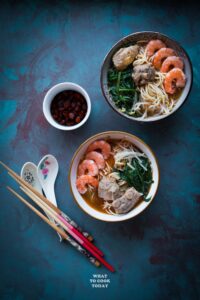
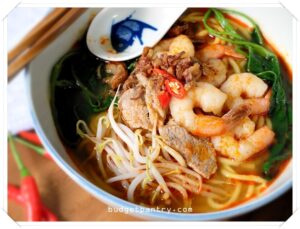
Fried Hokkien prawn noodles, also known as Hokkien mee in the local language, are made of thick yellow noodles that are fried in a flavorful prawn and pork. Prawns are the main ingredient in the Singaporean variants, which are more accurately referred to as hae mee. Singapore’s style of hae mee is stir-fried and lighter in colour. The Muslim community can eat certified Halal Hokkien mee since it contains neither pork nor pork lard and only chicken. The sambal and lime were added to give an extra kick to the dish. Nevertheless, it gives pleasure to spice lovers!
| Place of Origin | China |
| Alternative name | Hae mee |
| Type/ Course | Noodle/ Main course |
| Main Ingredients |
|
| Best Time to Eat | Breakfast |
27. Chwee Kueh (Water Rice Cake)
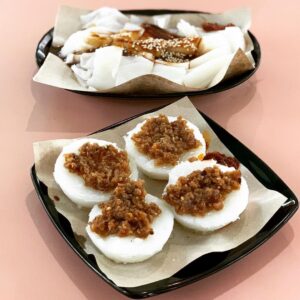
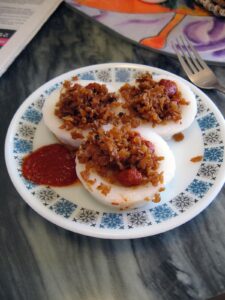
Steamed rice cakes with a sweet and sour turnip mince topping are known as “Chwee Kueh” in Singapore. Sambal is typically served on the side with it. It is a common breakfast, but it can also serve as an afternoon snack. These can be purchased for as little as $2 for a packet of three to four cakes. The stall is typically located at a hawker centre and is run by an elderly aunt or uncle who simply flip out rice cakes all day.
| Place of Origin | China & Singapore |
| Alternative name | NA |
| Type/ Course | Snack |
| Main Ingredients |
|
| Best Time to Eat | Breakfast |
28. Otak-Otak
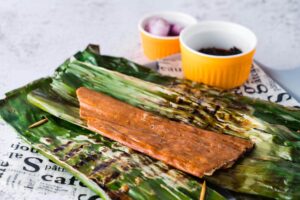
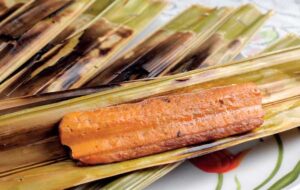
The savoury snack otak-otak; often spelt Otah, has Malay and Peranakan roots. It consists of a mixture of raw fish, finely chopped onions, coconut milk, herbs, and spices that is bound with an egg. The purée is typically wrapped in a banana leaf and cooked in the oven or over an open charcoal fire. Chili, turmeric and other spices give the food in Singapore and southern Malaysia its reddish-orange or brown colour. The otak-otak can be enjoyed alone in addition to serving as a side dish.
| Place of Origin | Indonesia |
| Alternative name | Otah |
| Type/ Course | Fritter |
| Main Ingredients |
|
| Best Time to Eat | Any time of the day |
29. Murtabak
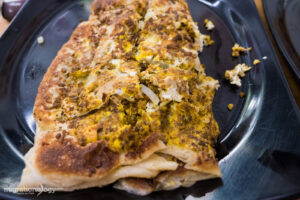
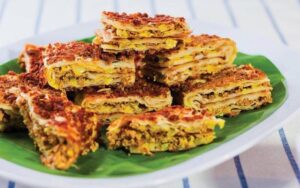
A murtabak is a tiny dough packet that is frequently filled with egg and beef mince and fried in oil till golden crisp. Although it originated as an Arab dish, it is now widely consumed in Southeast Asia, especially in Singapore. One of the best foods to consume while visiting Singapore is murtabak, which is a blend of Arab and Indian flavours, spices, and cooking styles.
| Place of Origin | Yemen |
| Alternative name | Motabbaq, matabbak, muttabak, metabbak, mutabbaq, mataba |
| Type/ Course | Pancake |
| Main Ingredients |
|
| Best Time to Eat | Tea |
30. Tandoori Chicken
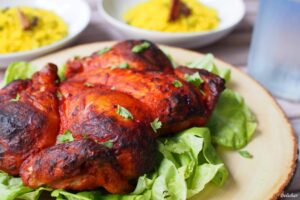
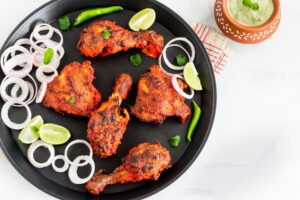
Tandoori Chicken is a chicken dish made by roasting marinated chicken in yoghurt and spices in a tandoor, which is a cylindrical clay oven. The marinade of yoghurt and lemon spices makes the grilled Tandoori Chicken succulently juicy. It’s smoky from the grill and the smoked paprika, and it’s layered with earthy flavours like garam masala, ginger, and garlic. It has a slight kick to it, but just the right amount of heat.
| Place of Origin | India |
| Alternative name | NA |
| Type/ Course | Appetizer or Main course |
| Main Ingredients |
|
| Best Time to Eat | Dinner |
31. Naan
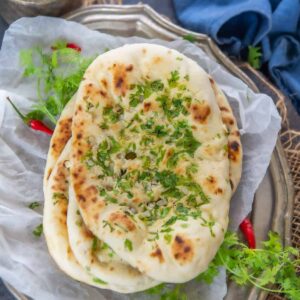
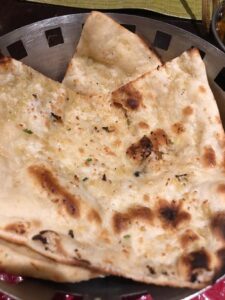
Naan is an oven-baked leavened flatbread from India. It resembles pita bread, but unlike pita, it contains yoghurt, milk, and occasionally eggs or butter, making it softer than pita bread. Traditional Naan is made with flour, salt, yeast, and yoghurt to create a smooth, elastic dough. It’s a tasty appetizer or snack that comes in a variety of flavours. Should give this a try!
| Place of Origin | India |
| Alternative name | NA |
| Type/ Course | Appertizer |
| Main Ingredients |
|
| Best Time to Eat | Any time of the day |
32. Bubur Cha Cha
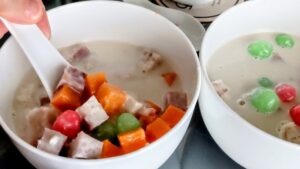
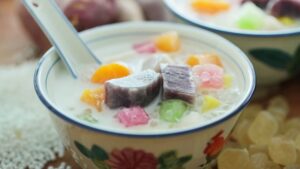
Bubur Cha Cha is a coconut milk dessert that commonly contains sweet potatoes and taro. In Malaysia and Singapore, bubur cha-cha is usually served as a dessert or sometimes for supper. This is one of the more popular Nyonya/Peranakan desserts which is colourful yet delicious. This dessert is delightful and warming when served hot during the colder seasons and refreshing when served cold during the hotter seasons of the year.
| Place of Origin | Brunei, Indonesia, Malaysia, Singapore and Thailand |
| Alternative name | NA |
| Type/ Course | Dessert/ Breakfast |
| Main Ingredients |
|
| Best Time to Eat | Supper |
33. Black Pepper Crab
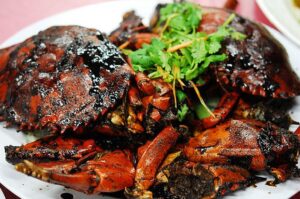
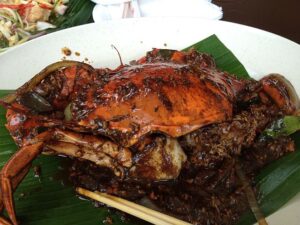
In Singapore, black pepper crab is legendary. It’s made with hard-shell crabs that have been fried with black pepper. The black pepper flavour is prominent, but it blends well with other flavours where the sweetness of the crab flavour is easily discernible. The black pepper spiciness is just right. The flavour is one-of-a-kind, with its buttery spicy saucy paste forming a sauce that coats the fresh crab perfectly.
| Place of Origin | Singapore |
| Alternative name | NA |
| Type/ Course | Main course |
| Main Ingredients |
|
| Best Time to Eat | Lunch, dinner |
34. Chilli Crab
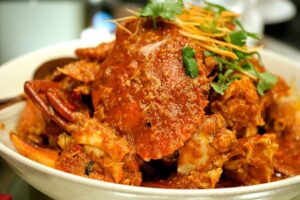
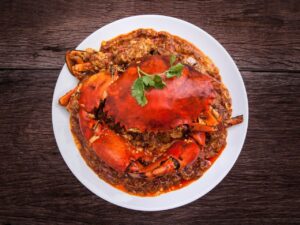
This one is a little bit different from black pepper crab. Chilli crab is a popular seafood dish and a favourite amongst locals and foreigners. It consists of mud crabs deep-fried in a sweet, savoury, and spicy gravy. Mud crabs are commonly used and stir-fried in a semi-thick, sweet and sour tomato-and-chilli sauce. Despite its name, chilli crab is only mildly spicy. The crab is delicious, but the sauce steals the show – sweet, savoury, slightly spicy, and supremely satisfying!
| Place of Origin | Singapore |
| Alternative name | NA |
| Type/ Course | Main course |
| Main Ingredients |
|
| Best Time to Eat | Lunch, dinner |
35. Rawon
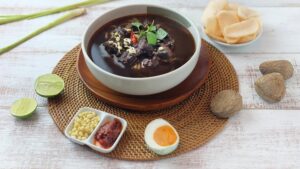
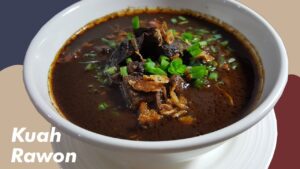
Rawon is a uniquely Indonesian dish from East Java. Slow-braised beef and other traditional Indonesian ingredients such as lime leaves, lemongrass, ginger, and chilli are used to make this flavorful soup. Rawon, unlike other soups, has rich ingredients and a striking appearance. This dish goes well with white plain rice.
| Place of Origin | Indonesia |
| Alternative name | NA |
| Type/ Course | Soup |
| Main Ingredients |
|
| Best Time to Eat | Dinner |
36. Putu Mayam
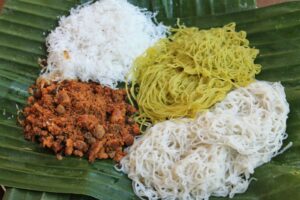
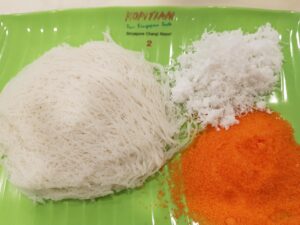
Putu Mayam is a popular Indian street food from the state of Tamil Nadu. It has the appearance of noodles, very similar to the vermicelli noodles used in Chinese dishes. It’s best served cold with a small amount of sweetener, making it a refreshing breakfast or snack on hot days.
| Place of Origin |
|
| Alternative name |
|
| Type/ Course | Dessert |
| Main Ingredients | Rice flour |
| Best Time to Eat | Tea |
*MOST DELICIOUS FOOD IN SINGAPORE*
37. Butter Chicken

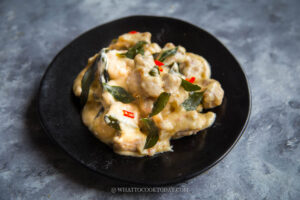
The mildly sweet flavour of butter chicken is due to the butter base, which reduces the intensity of the curry spices used in its preparation. The superb combination of cream sauce, butter, spiced-up tomatoes, and an array of Indian spices melts in your mouth. If you enjoy chicken, this is a must-try dish for you.
| Place of Origin | India |
| Alternative name |
|
| Type/ Course | Curry |
| Main Ingredients |
|
| Best Time to Eat | Lunch, dinner |
38. Curry Fish Head
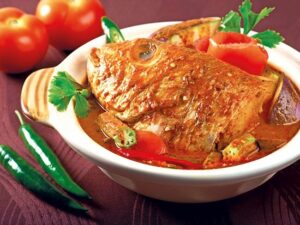
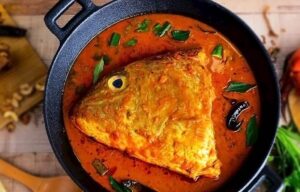
This spicy dish is a delectable curry stew made with vegetables and, of course, the entire head of a fish. This delectable dish is typically prepared with both tamarind and coconut milk, which gives it a rich, nuanced flavour. Singaporeans enjoy chicken curry because the country has a plethora of fresh ingredients to use in its preparation. Furthermore, chicken curry can be eaten at any time or in any location!
| Place of Origin | Singapore |
| Alternative name | Kari Kepala Ikan |
| Type/ Course | Curry/ Main course |
| Main Ingredients |
|
| Best Time to Eat | Lunch & Dinner |
39. BBQ Sambal Stingray
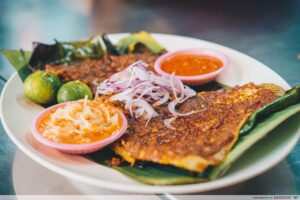
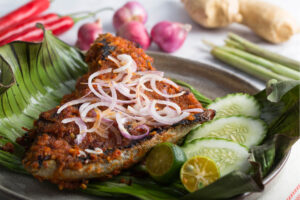
Sambal stingray is a stingray wing that has been barbecued on a banana leaf and smothered in sambal. The fiery dish is popular in Singapore and Malaysia. An excellent sambal stingray is charred while remaining juicy and smooth. It’s topped with aromatic and tasty sambal.
| Place of Origin | Malaysia |
| Alternative name | Ikan pari bakar |
| Type/ Course | Main course |
| Main Ingredients |
|
| Best Time to Eat | Dinner |
40. Durian
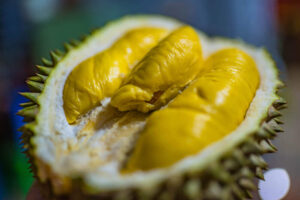
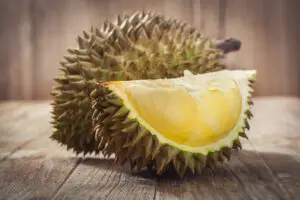
Durian is a tropical fruit distinguished by its large size and spiky, hard outer shell. It has a pungent smell and custard-like flesh with large seeds. This fruit has a strange combination of savoury, sweet, and creamy all at once. But trust me, once you try it, one is not enough!
| Place of Origin | Southeast Asia |
| Alternative name | NA |
| Type/ Course | Dessert |
| Main Ingredients | NA |
| Best Time to Eat | Any time of the day |
41. Mee Siam
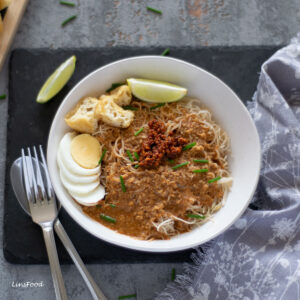
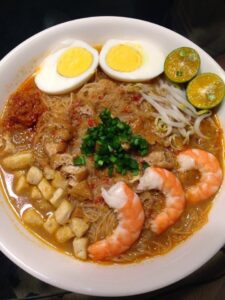
Mee Siam is a bee hoon (rice vermicelli) dish with a different sweet and tart gravy. It’s a spicy stir-fried rice vermicelli dish that can be eaten for breakfast, lunch, or dinner. Mee Siam is frequently served at special events in Singapore and Malaysia. It’s topped with a shredded omelette, scallions, and lime wedges, which make every bite a delight to eat. This is a dish that will make your tastebuds tingle.
| Place of Origin | Malaysia |
| Alternative name | NA |
| Type/ Course | Noodle |
| Main Ingredients |
|
| Best Time to Eat | Breakfast, lunch and dinner |
42. Mee Rebus
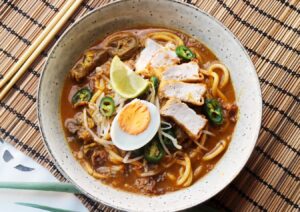
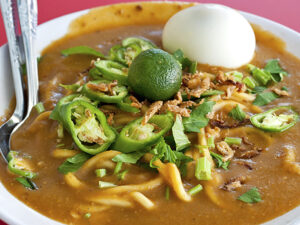
Mee Rebus is a Malay noodle dish served with sweet potato gravy. With a generous squeeze of lime juice, the combination of sweet and savoury flavours is deliciously enhanced. This noodle dish is popular in Malaysia, Indonesia, and Singapore. Mee Rebus is available at hawker centres.
| Place of Origin | Maritime Southeast Asia |
| Alternative name | Mie rebus, mie kuah |
| Type/ Course | Main course |
| Main Ingredients |
|
| Best Time to Eat | Dinner & Supper |
43. Rojak
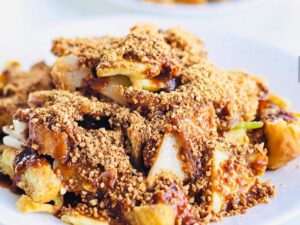
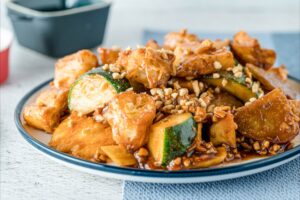
Rojak is a type of local salad made of cucumber, dried tofu, and fruits such as apple, pineapple, and guava. Rojak paste is made from fermented shrimp paste, chilli, and lime. It has a spicy, sweet, sour, and crunchy flavour. Rojak is commonly served as a side dish or as an appetizer, but it can also be served as a main course. Today, there are more rojak variations as new ingredients are creatively added to the spicy, sweet, and sour black sauce. The dish is commonly prepared by the Chinese and can be found in hawker centres or food courts.
| Place of Origin | Indonesia |
| Alternative name | Rujak |
| Type/ Course | Salad |
| Main Ingredients |
|
| Best Time to Eat | Tea, Dinner |
44. Laksa
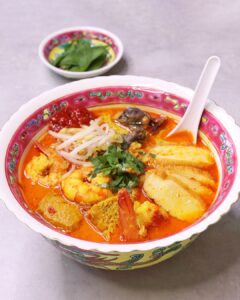

The spicy soup stock is the colour of a flaming sunset, flavoured with coconut milk and dried shrimp, and topped with cockles, prawns, and fishcakes. The creamy laksa flavour is enhanced by the spiciness of the sambal. The dish is available in restaurants and hawker centres throughout Singapore.
| Place of Origin | Maritime Southeast Asia |
| Alternative name | NA |
| Type/ Course | Noodle |
| Main Ingredients |
|
| Best Time to Eat | Breakfast, lunch & dinner |
45. Biryani
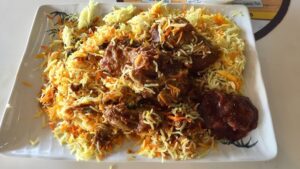
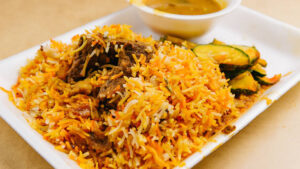
Biryani is fragrant rice cooked together with spices that give an aromatic flavour to the rice. Basmati rice is commonly used in the preparation of biryani rice. This is one of the popular dishes that can be found in local hawker centres. When the best of the best come together, you get the best of the best.
| Place of Origin | India |
| Alternative name | Briyani |
| Type/ Course | Main dish |
| Main Ingredients |
|
| Best Time to Eat | Lunch & dinner |
46. Assam Pedas
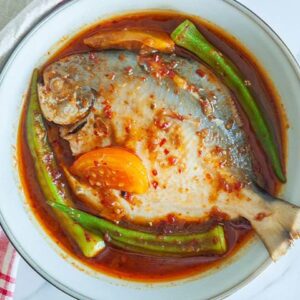
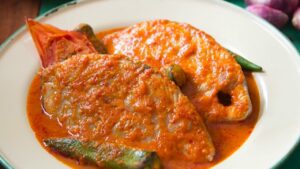
Assam pedas is a sour yet spicy dish that tastes extraordinarily satisfying. It’s like the most delicious fish curry ever, on par with Indonesian-style fish head curry. It has everything: spicy, sour, sweet, and savoury, and it goes well with rice. If you haven’t tried this dish yet, you definitely should!
| Place of Origin | Indonesia |
| Alternative name | NA |
| Type/ Course | Main course |
| Main Ingredients |
|
| Best Time to Eat | Lunch & dinner |
47. Soto Ayam
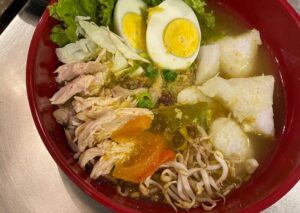
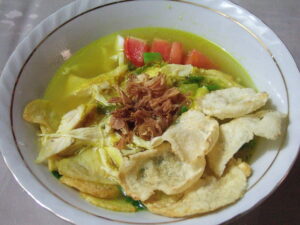
Soto Ayam is a chicken dish with a homemade spice paste that is served with toppings. Lemongrass, galangal, and kaffir lime leaves to flavour the broth. Layers of mild earthy and aromatic flavours are created by combining herbs and spices. It’s the perfect soup for a cold or rainy day.
| Place of Origin | Indonesia |
| Alternative name | NA |
| Type/ Course | Soup/ Main course |
| Main Ingredients |
|
| Best Time to Eat | Dinner |
48 Soup Kambing
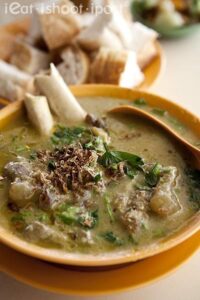
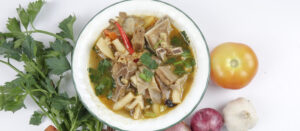
Soup kambing is one of those dishes that has been around forever, but its popularity has waned in recent years, particularly among the younger generation. For those who are unfamiliar, the dish is a Muslim Indian mutton soup stewed in rich spices and served with bread. Soup kambing is one of the best comfort foods!
| Place of Origin | Indonesia |
| Alternative name | Sop kambing |
| Type/ Course | Soup/ Main course |
| Main Ingredients | Mutton or goat meat |
| Best Time to Eat | Dinner |
49. Lontong
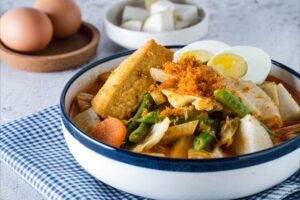
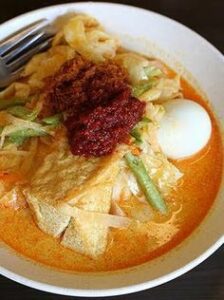
Lontong is a dish consisting of compressed rice cakes served with a side dish of peanut-based sauces or as an accompaniment to curries and stews. Sayur lodeh, a dish of vegetable stew in coconut curry with compressed rice, is also known as lontong in Singapore. The creamy texture of the gravy combined with the compressed rice, boiled egg, tofu, and vegetables is the epitome of perfection.
| Place of Origin | Indonesia |
| Alternative name | NA |
| Type/ Course | Main course |
| Main Ingredients |
|
| Best Time to Eat | Breakfast & lunch |
50. Pecel Lele
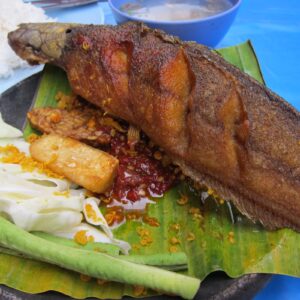
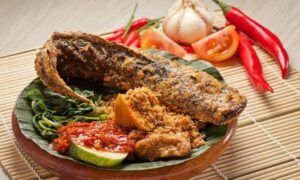
Pecel Lele is a cheap and filling dish that usually consists of deep-fried catfish served with a warm plate of rice, cabbage, cucumber, basil leaves, and, of course, the traditional tomato-based sambal on the side. Pecel lele has spread to neighbouring countries such as Malaysia and Singapore because it is inexpensive and uses only the freshest ingredients.
| Place of Origin | Indonesia |
| Alternative name | NA |
| Type/ Course | Main course |
| Main Ingredients | Clarias catfish served with sambal traditional chilli paste |
| Best Time to Eat | Lunch & dinner |
51. Rojak Bandung
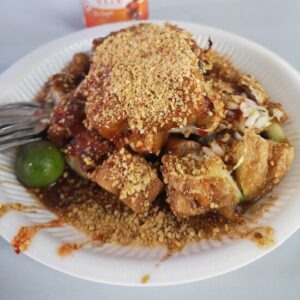
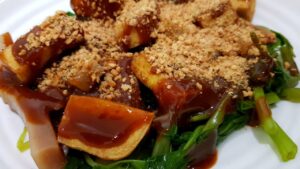
Rojak (Malaysian and Singaporean spelling) or Rujak (Indonesian spelling) is a popular fruit and vegetable salad in Indonesia, Malaysia, and Singapore. There are also non-vegetarian salads, such as this one. The word “Rojak” means “mixture.” It is also used as a colloquial expression for an eclectic mix, particularly to describe Malaysian and Singaporean society’s multi-ethnic character. Rojak Bandung is ideal for sharing with family and friends over a good laugh. Dapur Ibu Rojak Bandung promises a flavorful dish whether you prefer spicy or non-spicy!
| Place of Origin | Singapore |
| Alternative name | Rujak |
| Type/ Course | Side dish |
| Main Ingredients |
|
| Best Time to Eat | Tea & supper |
52. Vadai
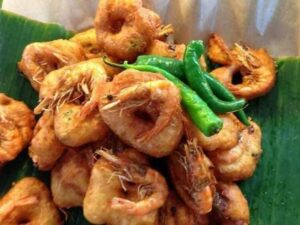
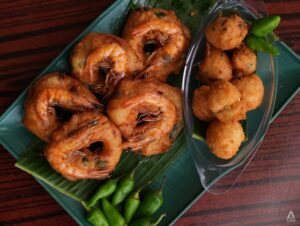
Vadai is a savoury South Indian snack made from soaked or fermented pulses that are formed into balls or doughnut shapes and deep fried. The finished product is soft on the inside and crispy on the outside. Singaporeans eat vadai with green chilli, a tradition that most likely originated in the local Chinese community. However, because the Indian variety of green chilli is too spicy to eat whole, this is a rare practice in India. The doughnut-shaped version is also commonly served with coconut chutney in Singapore.
| Place of Origin | India |
| Alternative name | wada, vade, vadai, bara |
| Type/ Course | Snack |
| Main Ingredients |
|
| Best Time to Eat | Breakfast |
53. Drunken Prawns
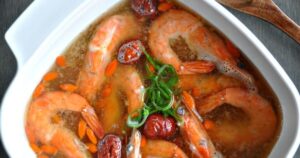
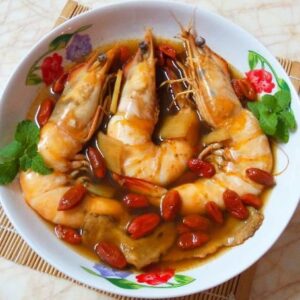
Drunken prawn is a popular Chinese dish made with freshwater shrimp that can be eaten cooked or raw. To facilitate consumption, the shrimp are immersed in liquor. The prawns and shells add extra sweetness to the soup broth that comes from the freshness of the prawns, and when combined with the slight bitterness from the Chinese herbs and wine, the dish is perfectly heavenly!
| Place of Origin | China |
| Alternative name | NA |
| Type/ Course | Side dish |
| Main Ingredients |
|
| Best Time to Eat | Dinner |
54. Yong Tau Foo
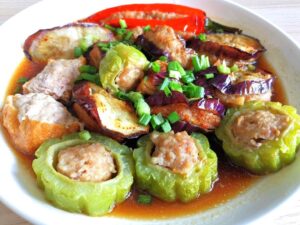
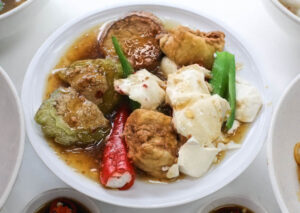
Yong Tau Foo is one of the popular Hakka Chinese dishes made by stuffing meat and/or fish paste in tofu and vegetables such as bitter gourd, okra, peppers, eggplants, mushrooms, etc. It can be served in soup or dry with a sweet bean sauce.
| Place of Origin | China |
| Alternative name | NA |
| Type/ Course | Soup/ Main course |
| Main Ingredients |
|
| Best Time to Eat | Dinner & supper |
55. Kway chap
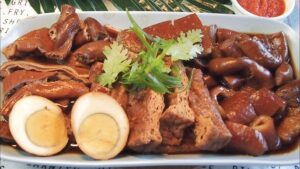

Kway chap is a traditional Singaporean dish made of flat rice sheets in a soy sauce broth with a variety of sides like pig tongue, offal, pork rinds, pork belly, hard-boiled eggs, fishcakes, or preserved vegetables. Typically, the meat is braised with spices such as cinnamon, cloves, and anise. The broth is said to be light but flavorful, and the rice sheets, known as kway, should never stick together. The dish is available at a variety of hawker stalls throughout Singapore.
| Place of Origin | China |
| Alternative name | Kuay chap
Kueh chap |
| Type/ Course | Soup |
| Main Ingredients |
|
| Best Time to Eat | Dinner |
Here you are – the list of the best local food in Singapore that you absolutely must try! We hope that the variety of dishes presented will give you a true taste of the diversity found in Singaporean cuisine. Feeling hungry already? Wait no more, just step outside and indulge your tastebuds!

Summary
FAQs
What is the local food of Singapore?
Singaporean cuisine is derived from several ethnic groups that have evolved over centuries of this cosmopolitan city-political, state’s economic, and social changes. Influences include Malay, Chinese, and Indian cuisines, as well as Indonesian, Peranakan, and Western traditions (particularly English and Portuguese-influenced Eurasian, known as Kristang).
Food is important to Singapore’s national identity and serves as a unifying cultural thread. Eating is declared a national pastime and food is declared a national obsession in Singaporean literature. Food is a popular topic of discussion among Singaporeans.
What is the most popular food in Singapore?
The most popular dish in Singapore is chicken rice. It is regarded as one of Singapore’s national dishes and is most frequently related to Singaporean food.
What dish is unique to Singapore?
Chilli crab. According to legend, a couple who operated a pushcart in 1956 is credited with creating this meal. In addition to steaming, the husband asked his wife to try several additional crab cooking techniques. Their stir-fried crabs in tomato sauce gained enormous popularity after receiving the addition of chilli. Later, a local chef gave the dish a small change by cooking the gravy with eggs, tomato paste, and sambal sauce (a native chile and shrimp paste). This is presently the variation that Singaporeans most frequently order.
